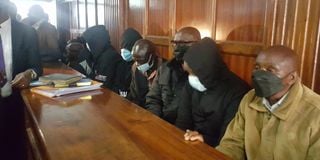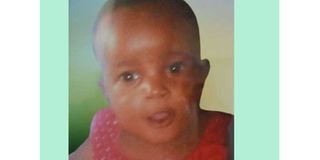Premium
Baby Pendo murder case: Senior officers lose bid for petition to be heard by bench

Some of the 12 police officers arraigned at Milimani High Court over the killing of Baby Pendo at Kondele Kisumu in 2017.
The High Court has rejected an application by former senior police officers accused of killing Baby Pendo among other victims, for a petition challenging crimes against humanity brought against them be heard by more than one judge.
The police officers were charged in 2022 under the International Crimes Act following the killing of 39 people in Kisumu County after the 2017 General Election.
But the officers, among them service commanders’ challenge their prosecution under the Act, arguing that they do not meet the threshold of crimes against humanity.
Although Justice Kanyi Kimondo agreed that the issues raised were serious, a single judge can determine the questions posed in the petition.
The judge noted that the International Crimes Act dates back to the year 2008 and its enactment was informed by the post-election violence that engulfed the country.

Six-month-old Samantha Pendo who died of head injuries sustained during a police raid at their family home in Nyalenda slums in Kisumu in August 2017.
“I agree with the applicant that the statute may not have undergone necessary amendments to align it fully with the Constitution and that Regulations under the Act may not have been enacted. That is a matter that can conveniently be addressed by the single judge and guided by section 7 (1) of the Sixth Schedule to the Constitution,” said the judge.
The suspects were charged with offences including murder, rape and torture, contrary to the International Crimes Act.
The former officers want the court to determine whether the allegations meet the threshold of international crimes and whether they were commanders or in effective responsibility of police officers under their control.
The officers include Titus Yoma, John Chengo, Benjamin Koima, Benjamin Lorema, Volker Edambo, Cyprine Robe Wakio, Josephat Sensira, James Rono, Lima Kogey and Mohamed Ali Guyo. An eleventh suspect, Mohammed Baa, was still at large when others were charged.
The officers claimed that the issues raised in the petition were substantial issues of law. They submitted that for instance, there was a need to resolve conflicts between the International Crimes Act, which pre-dates the Constitution, and the Rome Statute and, to define the applicable Regulations or procedures for a trial before the High Court.
They also contended that the charges disclosed in the information do not meet the threshold of international crimes based on “command structure” and that both the local statute and the Rome Statute are in conflict with Article 245 of the Constitution.
“I have no doubt that the issues are not easy. But they do not raise novel or substantial questions of law that cannot be conveniently determined by a single judge of the High Court,” said the judge.
Justice Kimondo said the issues cannot be resolved merely by constituting a bench of the same court. “It is true that a panel of judges brings more minds to bear on an issue. But the panel’s decision does not rank any higher than that of a single judge,” he added.
They are alleged to have committed the offences on diverse dates in August 2017 at Nyalenda, Kisumu East sub-County, after the disputed results of the 2017 General Election, which saw violence spread out to the informal settlements in Nyalenda, Kisumu.
The prosecution said the suspects were the commanders or in effective responsibility for police officers under their control in the region.
An inquest into the death of Baby Samantha Pendo found that police officers were liable for her death.




